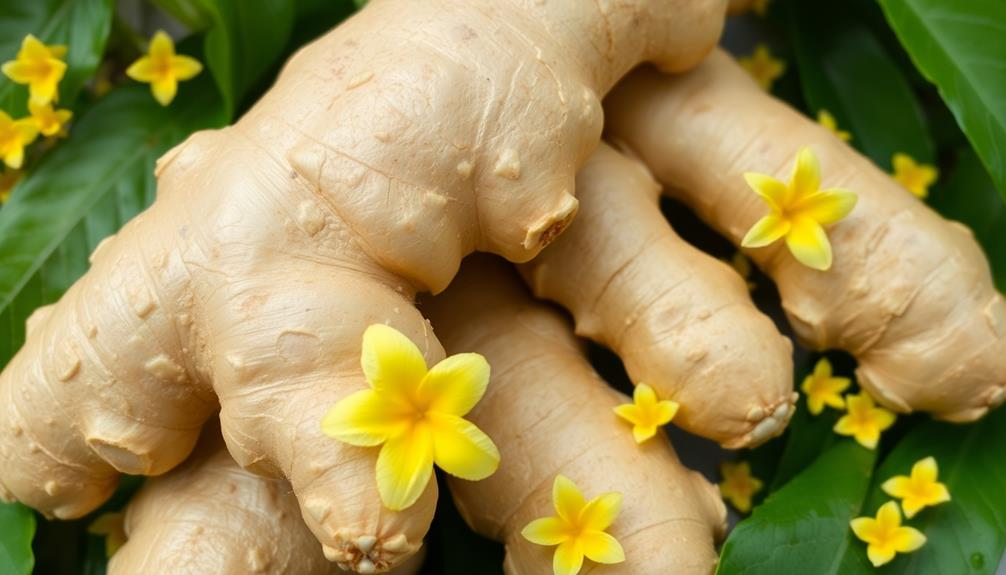Rosehip oil has a unique, earthy smell that's quite different from the sweet, floral scents you might expect. When you open a bottle, you might first notice a strong, nutty aroma that can remind you of autumn leaves or even cold tea. This scent can soften and change a bit after exposure to air. Remember, high-quality rosehip oil will smell pleasant, while any rancid or sour odors mean it's gone bad. It's a lovely addition to your skincare routine, bringing a cozy vibe. Want to know more about the wonders of rosehip oil? Keep exploring!
Key Takeaways
- Rosehip oil has a unique earthy aroma with nutty undertones, differing from the sweet floral scent of traditional rose oils.
- The scent can vary significantly upon opening, sometimes presenting a strong or pungent odor that softens over time.
- High-quality rosehip oil should have a pleasant, subtle aroma; unpleasant smells may indicate spoilage or improper storage.
- Individual scent perception varies, influenced by personal sensitivity, environmental factors, and the oil's age and quality.
- CO2 extraction methods preserve the oil's natural scent, while pressing methods can alter its aroma quality.
Introduction

When you think of rosehip oil, you might expect a sweet floral fragrance, but its smell is quite different. Instead, you'll discover a subtle aroma that leans toward an earthy scent. High-quality rosehip oil often has hints of cold tea, autumn leaves, or even cider. This unique scent can take you on a sensory journey through nature, making it a delightful natural option for your skincare routine.
Additionally, you may find that the calming effects of rosehip oil can complement other essential oils, such as essential oils for toothache relief, enhancing your overall wellness experience.
As you explore rosehip oil's smell, you might notice some users describing it as slightly nutty or herbaceous. This calming aroma can create a soothing experience for many.
It's essential to remember that oil smells can vary from person to person, so your impression of rosehip oil's scent might differ from someone else's.
A good rule of thumb is that high-quality rosehip oil shouldn't have strong or unpleasant odors. If you catch any rancid or sour smells, it's best to steer clear, as that indicates spoilage.
Description of the Smell

Although rosehip oil's scent may surprise you, it offers a unique and subtle earthy aroma that's distinct from the expected floral notes of traditional rose oils. You might notice that the rosehip oil smell has nutty undertones, which can remind you of cold tea, hay, or even autumn leaves. This earthy aroma sets it apart and makes it interesting to explore.
When used in aromatherapy, this earthy scent can complement blends aimed at relaxation and overall well-being, making it a versatile addition to your essential oil collection, particularly when combined with oils like lavender and chamomile for relaxation.
When you choose high-quality rosehip oil, you shouldn't encounter any strong or unpleasant smells. If you do, it could indicate spoilage or poor quality, which isn't what you want in your skincare routine. Instead, look for brands that use superior extraction methods, like CO2 extraction, which helps produce the freshest and most concentrated form of rosehip oil.
Some people might describe the scent as "funky," especially with certain brands like The Ordinary, but remember that everyone has different preferences.
Source and Composition

Understanding the source and composition of rosehip oil sheds light on its unique qualities and aroma. This oil comes from the seeds of the rosehip fruit, specifically the Rosa canina plant. To extract it, a pressing process is used, which impacts the oil's smell. The most popular extraction method, CO2 extraction, helps preserve its natural scent.
When you sniff high-quality rosehip oil, you'll notice its earthy aroma with subtle hints of nutty or herbaceous notes. This scent is quite different from the sweet, floral fragrance of rose essential oils. Depending on the quality of the oil and extraction methods used, the smell can vary. Some brands may even have a stronger or slightly "funky" aroma that surprises users.
One of the key players in the scent of rosehip oil is terpenes. These compounds not only contribute to the oil's unique aroma but also enhance its therapeutic benefits.
Typical Scenarios or Environments

Experiencing the scent of rosehip oil often happens in familiar settings, such as during your daily skincare routine or while indulging in a relaxing self-care ritual. When you open a bottle of this oil, you might notice its earthy and woody aroma, quite different from the typical floral aroma of rose essential oil. As you apply it, the calming and soothing scent wraps around you, creating a cozy atmosphere.
The use of natural oils like rosehip can be compared to eco-friendly practices that promote a healthier environment, such as sustainable forestry, which emphasizes the importance of using renewable resources.
In your bathroom or bedroom, you may find the scent slightly nutty or herbaceous, reminding you of nature. Some people even compare it to fish oil capsules, but your experience may vary based on the brand or extraction method.
While enjoying your skin care and repair routine, the comforting scent can help you unwind after a long day.
Whether you're mixing it with your favorite moisturizer or using it alone, the aroma of rosehip oil transforms your environment into a peaceful sanctuary. Each time you use it, you're not just caring for your skin; you're also embracing a moment of tranquility that enhances your self-care experience.
Emotional or Cultural Associations

The earthy and woody aroma of rosehip oil brings to mind a deep connection to nature, often evoking feelings of calm and grounding. When you smell this oil, it might remind you of autumn leaves or freshly cut hay. This unique scent differs from the sweeter, floral fragrances of rose petals, offering a more authentic experience.
Cultural associations with rosehip oil run deep. In many communities, it symbolizes traditional herbal remedies and natural healing practices that have been passed down through generations.
Using plant-based oils like rosehip connects you to a long history of holistic wellness, emphasizing the importance of organic and sustainable skincare solutions.
As you embrace this earthy aroma, you may feel a sense of simplicity and purity, appealing to your desire for natural ingredients over synthetic fragrances.
It's a reminder of the beauty found in nature and the ways we can care for ourselves naturally. So, the next time you enjoy rosehip oil, think about the rich cultural stories and emotional connections that come with it, celebrating both its scent and the healing power it represents.
Health or Safety Considerations

When enjoying the earthy aroma of rosehip oil, it's important to keep health and safety considerations in mind. First, you should always conduct a patch test when trying the oil for the first time. Just dab a little on a small area of your skin to check for any allergic reactions or sensitivity to its health properties. This simple step helps ensure you can enjoy the oil without worry!
Next, pay attention to the scent of the oil. A high-quality rosehip oil should have a subtle, pleasant aroma. If you notice an unusual scent, like something rancid or sour, it could mean the oil has expired or wasn't stored properly.
To keep the oil fresh and maintain its delightful smell, store it in a cool, dark place away from direct sunlight. This proper storage helps prevent off-putting odors that can spoil your experience.
Lastly, if the oil smells strong or off when you first open it, consider checking for freshness or trying a different brand. By following these tips, you can confidently enjoy the many benefits of rosehip oil while keeping safety in mind!
Final Thoughts

Many find the unique aroma of rosehip oil intriguing, as it diverges from the typical floral scents of other oils. Instead of sweet flowers, you'll notice a subtle, earthy scent that might remind you of cold tea, hay, or even autumn leaves.
The quality of the oil plays a big role in its aroma. High-quality rosehip oil, which often boasts a vibrant orange color due to its carotenoids, shouldn't have any unpleasant smells. If it does, it might be spoiled!
The extraction methods also affect the scent. For instance, CO2 extraction usually produces a fresher and more concentrated aroma.
Some users share their experiences, saying they detect a funky scent or a resemblance to fish oil capsules when they first open the bottle. This variety in scent perception is normal and can be part of the journey of using rosehip oil.
Frequently Asked Questions
Should Rosehip Oil Have a Smell?
Rosehip oil should have a subtle scent, but it varies. If you notice a strong or unpleasant smell, it's likely spoiled or poor quality. Fresh oil typically offers a light, earthy aroma that's quite pleasant.
How Can You Tell if Rosehip Oil Is Pure?
To tell if rosehip oil's pure, check its color—vibrant orange indicates high quality. Smell for subtle earthiness, avoiding rancid odors. Also, consider the extraction method; cold-pressed ensures freshness and potency. Store it properly.
When Should You Not Use Rosehip Oil?
You shouldn't use rosehip oil if you're allergic to roses, on open wounds, during active acne flare-ups, or if the oil smells rancid. Always patch test first, especially if you have sensitive skin.
Does Rose Hip Oil Go Rancid?
Yes, rosehip oil can go rancid if you don't store it properly. Keep it in a cool, dark place, and make sure it's sealed tightly to maintain its freshness and quality for longer.









